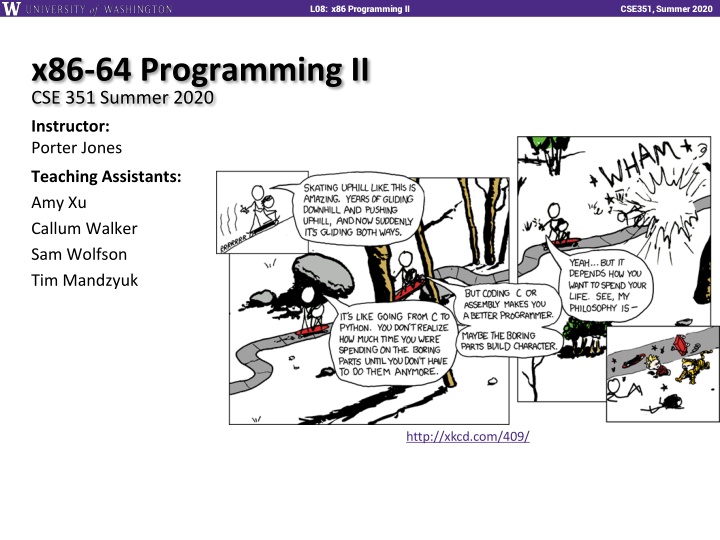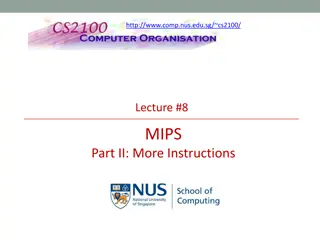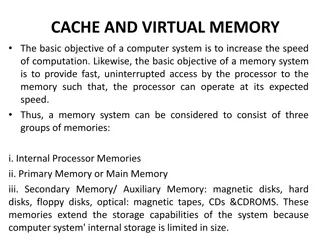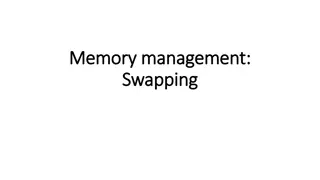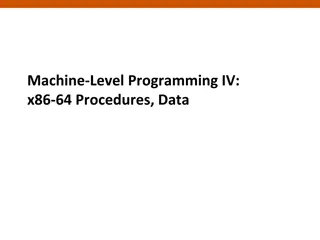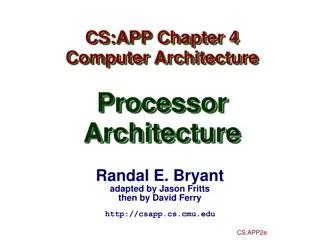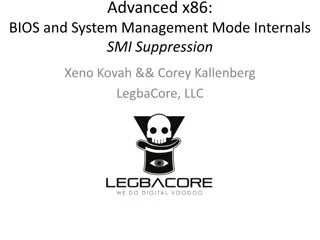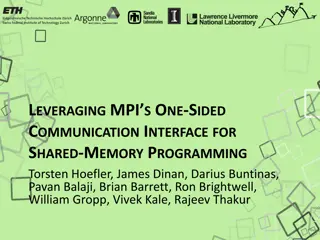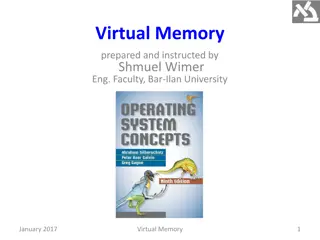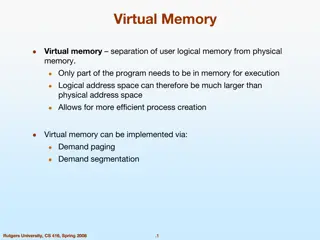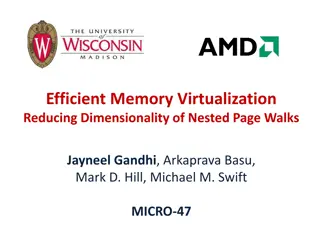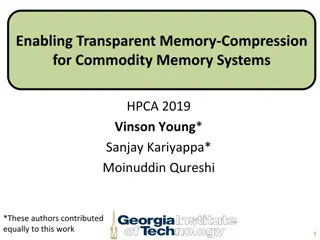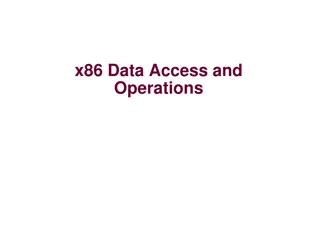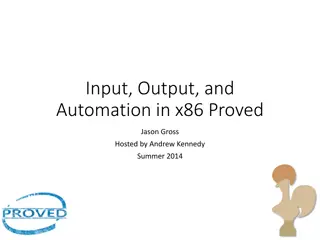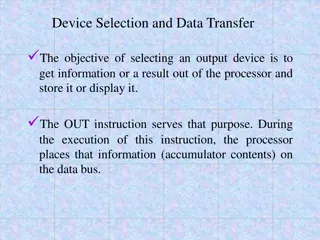x86 Programming II - Memory Addressing Modes and Instructions
In this x86 Programming II course for CSE351, Summer 2020, you will delve into memory addressing modes, data transfer instructions, arithmetic operations, and more. Explore concepts like basic memory addressing (R), indirect addressing, displacements, base and index registers, scale factors, and constant displacements. Understand how to utilize General Memory Addressing Modes and various instruction sets for efficient programming in x86-64 architecture. Get hands-on experience with debugging x86-64 assembly using gdb and enhance your skills in manipulating memory and data in low-level programming.
Download Presentation

Please find below an Image/Link to download the presentation.
The content on the website is provided AS IS for your information and personal use only. It may not be sold, licensed, or shared on other websites without obtaining consent from the author.If you encounter any issues during the download, it is possible that the publisher has removed the file from their server.
You are allowed to download the files provided on this website for personal or commercial use, subject to the condition that they are used lawfully. All files are the property of their respective owners.
The content on the website is provided AS IS for your information and personal use only. It may not be sold, licensed, or shared on other websites without obtaining consent from the author.
E N D
Presentation Transcript
L08: x86 Programming II CSE351, Summer 2020 x86-64 Programming II CSE 351 Summer 2020 Instructor: Porter Jones Teaching Assistants: Amy Xu Callum Walker Sam Wolfson Tim Mandzyuk http://xkcd.com/409/
L08: x86 Programming II CSE351, Summer 2020 Administrivia Questions doc: https://tinyurl.com/CSE351-7-10 See my email about accommodations! Lab 1b now due Monday at 11:59pm (7/13) Submit aisle_manager.c, store_client.c, and lab1Breflect.txt Can still use late days until 7/15 hw6, hw7 now due Monday (7/13) 10:30am Unit Summary 1 now due Friday (7/17) 11:59pm Can still use late days until 7/20 Mid-quarter Survey still due Friday (7/17) 11:59pm hw8, hw9, hw10 now due Monday (7/20) 10:30am 2
L08: x86 Programming II CSE351, Summer 2020 Administrivia Lab1a grades released later today Talk to us about any questions you have! Regrades open 24 hours after an assignment is due, stay open usually for about a week Lab 2 released later today! Debugging x86-64 assembly using gdb I will now drop your lowest homework score (see Syllabus for more details). Essentially will bump your homework total up by 11.5 points (the largest single homework total). 3
L08: x86 Programming II CSE351, Summer 2020 x86-64 Introduction Data transfer instruction (mov) Arithmetic operations Memory addressing modes Address computation instruction (lea) 4
L08: x86 Programming II CSE351, Summer 2020 Memory Addressing Modes: Basic (R) Mem[Reg[R]] Indirect: Data in register R specifies the memory address Like pointer dereference in C Example: movq (%rcx), %rax Displacement:D(R) Data in register R specifies the start of some memory region Constant displacement D specifies the offset from that address Example: movq 8(%rbp), %rdx Mem[Reg[R]+D] 5
L08: x86 Programming II CSE351, Summer 2020 Complete Memory Addressing Modes General: D(Rb,Ri,S) Mem[Reg[Rb]+Reg[Ri]*S+D] Rb: Base register (any register) Ri: Index register (any register except %rsp) S: Scale factor (1, 2, 4, 8) why these numbers? D: Constant displacement value (a.k.a. immediate) Special cases (see CSPP Figure 3.3 on p.181) D(Rb,Ri) Mem[Reg[Rb]+Reg[Ri]+D] (S=1) (Rb,Ri,S) Mem[Reg[Rb]+Reg[Ri]*S] (D=0) (Rb,Ri) Mem[Reg[Rb]+Reg[Ri]] (,Ri,S) Mem[Reg[Ri]*S] (S=1,D=0) (Rb=0,D=0) 6
L08: x86 Programming II CSE351, Summer 2020 Address Computation Examples %rdx 0xf000 D(Rb,Ri,S) Mem[Reg[Rb]+Reg[Ri]*S+D] %rcx 0x0100 Expression Address Computation Address 0x8(%rdx) (%rdx,%rcx) (%rdx,%rcx,4) 0x80(,%rdx,2) 7
L08: x86 Programming II CSE351, Summer 2020 Address Computation Instruction leaq src, dst "lea" stands for load effective address srcis address expression (any of the formats we ve seen) dstis a register Sets dst to the address computed by the src expression (does not go to memory! it just does math) Example: leaq (%rdx,%rcx,4), %rax Uses: Computing addresses without a memory reference e.g. translation of p = &x[i]; Computing arithmetic expressions of the form x+k*i+d Though k can only be 1, 2, 4, or 8 8
L08: x86 Programming II CSE351, Summer 2020 Example: lea vs. mov Registers Memory Word Address %rax 0x400 0x120 123 0xF 0x118 %rbx 0x8 0x110 %rcx 0x4 0x10 0x108 %rdx 0x100 0x1 0x100 %rdi %rsi leaq (%rdx,%rcx,4), %rax movq (%rdx,%rcx,4), %rbx leaq (%rdx), %rdi movq (%rdx), %rsi 9
L08: x86 Programming II CSE351, Summer 2020 lea It just does math 10
L08: x86 Programming II CSE351, Summer 2020 Register Use(s) Arithmetic Example %rdi 1st argument (x) %rsi 2nd argument (y) long arith(long x, long y, long z) { long t1 = x + y; long t2 = z + t1; long t3 = x + 4; long t4 = y * 48; long t5 = t3 + t4; long rval = t2 * t5; return rval; } %rdx 3rd argument (z) arith: leaq (%rdi,%rsi), %rax addq %rdx, %rax leaq (%rsi,%rsi,2), %rdx salq $4, %rdx leaq 4(%rdi,%rdx), %rcx imulq %rcx, %rax ret Interesting Instructions leaq: address computation salq: shift imulq: multiplication Only used once! 11
L08: x86 Programming II CSE351, Summer 2020 Register Use(s) Arithmetic Example %rdi x %rsi y long arith(long x, long y, long z) { long t1 = x + y; long t2 = z + t1; long t3 = x + 4; long t4 = y * 48; long t5 = t3 + t4; long rval = t2 * t5; return rval; } %rdx z, t4 %rax t1, t2, rval %rcx t5 arith: leaq (%rdi,%rsi), %rax # rax/t1 = x + y addq %rdx, %rax # rax/t2 = t1 + z leaq (%rsi,%rsi,2), %rdx # rdx = 3 * y salq $4, %rdx # rdx/t4 = (3*y) * 16 leaq 4(%rdi,%rdx), %rcx # rcx/t5 = x + t4 + 4 imulq %rcx, %rax # rax/rval = t5 * t2 ret 12
L08: x86 Programming II CSE351, Summer 2020 Polling Question [Asm II a] Which of the following x86-64 instructions correctly calculates %rax = 9 * %rdi? Vote at http://pollev.com/pbjones A. leaq (,%rdi,9), %rax B. movq (,%rdi,9), %rax C. leaq (%rdi,%rdi,8), %rax D. movq (%rdi,%rdi,8), %rax E. We re lost 13
L08: x86 Programming II CSE351, Summer 2020 Register Use(s) Control Flow %rdi 1st argument (x) %rsi 2nd argument (y) %rax return value long max(long x, long y) { long max; if (x > y) { max = x; } else { max = y; } return max; } max: ??? movq %rdi, %rax ??? ??? movq %rsi, %rax ??? ret 14
L08: x86 Programming II CSE351, Summer 2020 Register Use(s) Control Flow %rdi 1st argument (x) %rsi 2nd argument (y) %rax return value long max(long x, long y) { long max; if (x > y) { max = x; } else { max = y; } return max; } max: if x <= y then jump to else movq %rdi, %rax jump to done else: movq %rsi, %rax done: ret Conditional jump Unconditional jump 15
L08: x86 Programming II CSE351, Summer 2020 Conditionals and Control Flow Conditional branch/jump Jump to somewhere else if some condition is true, otherwise execute next instruction Unconditional branch/jump Always jump when you get to this instruction Together, they can implement most control flow constructs in high-level languages: if (condition) then { } else{ } while (condition) { } do{ } while (condition) for (initialization; condition; iterative) { } switch { } 16
L08: x86 Programming II CSE351, Summer 2020 x86 Control Flow Condition codes Conditional and unconditional branches Loops Switches 17
L08: x86 Programming II CSE351, Summer 2020 Processor State (x86-64, partial) Registers %rax %rbx %rcx %rdx %rsi %rdi Information about currently executing program Temporary data ( %rax, ) Location of runtime stack ( %rsp ) Location of current code control point ( %rip, ) Status of recent tests ( CF, ZF, SF, OF ) %r8 %r9 %r10 %r11 %r12 %r13 %r14 %r15 %rsp %rbp current top of the Stack Program Counter (instruction pointer) %rip CF ZF SF OF Condition Codes Single bit registers: 18
L08: x86 Programming II CSE351, Summer 2020 Condition Codes (Implicit Setting) Implicitly set by arithmetic operations (think of it as side effects) Example: addq src, dst r = d+s CF=1 if carry out from MSB (unsigned overflow) ZF=1if r==0 SF=1 if r<0 (if MSB is 1) OF=1 if signed overflow (s>0 && d>0 && r<0)||(s<0 && d<0 && r>=0) Not set by lea instruction (beware!) CF ZF SF OF Carry Flag Zero Flag Sign Flag Overflow Flag 19
L08: x86 Programming II CSE351, Summer 2020 Condition Codes (Explicit Setting: Compare) Explicitly set by Compare instruction cmpq src1,src2 cmpq a,b sets flags based on b-a, but doesn t store b-a CF=1 if carry out from MSB (good for unsigned comparison) ZF=1if a==b SF=1 if (b-a)<0 (if MSB is 1) OF=1 if signed overflow (a>0 && b<0 && (b-a)>0) || (a<0 && b>0 && (b-a)<0) CF ZF SF OF Carry Flag Zero Flag Sign Flag Overflow Flag 20
L08: x86 Programming II CSE351, Summer 2020 Condition Codes (Explicit Setting: Test) Explicitly set by Test instruction testq src2,src1 testq a,b sets flags based on a&b, but doesn t storea&b Useful to have one of the operands be a mask Can t have carry out (CF) or overflow (OF) ZF=1if a&b==0 SF=1 if a&b<0 (signed) CF ZF SF OF Carry Flag Zero Flag Sign Flag Overflow Flag 21
L08: x86 Programming II CSE351, Summer 2020 Using Condition Codes: Jumping j* Instructions Jumps to target (an address) based on condition codes Instruction jmp target je target jne target js target jns target jg target jge target jl target jle target ja target jb target Condition 1 ZF ~ZF SF ~SF ~(SF^OF)&~ZF Greater (Signed) ~(SF^OF) (SF^OF) (SF^OF)|ZF ~CF&~ZF CF Description Unconditional Equal / Zero Not Equal / Not Zero Negative Nonnegative Greater or Equal (Signed) Less (Signed) Less or Equal (Signed) Above (unsigned > ) Below (unsigned < ) 22
L08: x86 Programming II CSE351, Summer 2020 Using Condition Codes: Setting set* Instructions Set low-order byte of dst to 0 or 1 based on condition codes Does not alter remaining 7 bytes Instruction sete dst setne dst sets dst setns dst setg dst setge dst setl dst setle dst seta dst setb dst Condition ZF ~ZF SF ~SF ~(SF^OF)&~ZF Greater (Signed) ~(SF^OF) (SF^OF) (SF^OF)|ZF ~CF&~ZF CF Description Equal / Zero Not Equal / Not Zero Negative Nonnegative Greater or Equal (Signed) Less (Signed) Less or Equal (Signed) Above (unsigned > ) Below (unsigned < ) 23
L08: x86 Programming II CSE351, Summer 2020 Reminder: x86-64 Integer Registers Accessing the low-order byte: %rax %rbx %rcx %rdx %rsi %rdi %r8 %r9 %r10 %r11 %r12 %r13 %r14 %r15 %al %r8b %bl %r9b %cl %r10b %dl %r11b %sil %r12b %dil %r13b %rsp %rbp %spl %r14b %bpl %r15b 24
L08: x86 Programming II CSE351, Summer 2020 Register Use(s) Reading Condition Codes %rdi 1st argument (x) %rsi 2nd argument (y) set* Instructions Set a low-order byte to 0 or 1 based on condition codes Operand is byte register (e.g. al, dl) or a byte in memory Do not alter remaining bytes in register Typically use movzbl (zero-extended mov) to finish job %rax return value int gt(long x, long y) { return x > y; } cmpq %rsi, %rdi # setg %al # movzbl %al, %eax # ret 25
L08: x86 Programming II CSE351, Summer 2020 Register Use(s) Reading Condition Codes %rdi 1st argument (x) %rsi 2nd argument (y) set* Instructions Set a low-order byte to 0 or 1 based on condition codes Operand is byte register (e.g. al, dl) or a byte in memory Do not alter remaining bytes in register Typically use movzbl (zero-extended mov) to finish job %rax return value int gt(long x, long y) { return x > y; } cmpq %rsi, %rdi # Compare x:y setg %al # Set when > movzbl %al, %eax # Zero rest of %rax ret 26
L08: x86 Programming II CSE351, Summer 2020 Aside: movz and movs movz__ src, regDest movs__src, regDest # Move with zero extension # Move with sign extension Copy from a smaller source value to a larger destination Source can be memory or register; Destination must be a register Fill remaining bits of dest with zero (movz) or sign bit (movs) movzSD / movsSD: S size of source (b = 1 byte, w = 2) D size of dest (w = 2 bytes, l = 4, q = 8) Example: movzbq %al, %rbx 0x?? 0x?? 0x?? 0x?? 0x?? 0x?? 0x?? 0xFF %rax 0x00 0x00 0x00 0x00 0x00 0x00 0x00 0xFF %rbx 27
L08: x86 Programming II CSE351, Summer 2020 Aside: movz and movs movz__ src, regDest movs__src, regDest # Move with zero extension # Move with sign extension Copy from a smaller source value to a larger destination Source can be memory or register; Destination must be a register Fill remaining bits of dest with zero (movz) or sign bit (movs) Note: In x86-64, any instruction that generates a 32-bit (long word) value for a register also sets the high-order portion of the register to 0. Good example on p. 184 in the textbook. movzSD / movsSD: S size of source (b = 1 byte, w = 2) D size of dest (w = 2 bytes, l = 4, q = 8) 0x00 0x00 0x7F 0xFF 0xC6 0x1F 0xA4 0xE8 %rax Example: movsbl (%rax), %ebx ...0x?? 0x?? 0x80 0x?? 0x?? 0x??... MEM Copy 1 byte from memory into 8-byte register & sign extend it 0x00 0x00 0x00 0x00 0xFF 0xFF 0xFF 0x80 %rbx 28
L08: x86 Programming II CSE351, Summer 2020 Summary Memory Addressing Modes: The addresses used for accessing memory in mov (and other) instructions can be computed in several different ways Base register, index register, scale factor, and displacement map well to pointer arithmetic operations Control flow in x86 determined by status of Condition Codes Showed Carry, Zero, Sign, and Overflow, though others exist Set flags with arithmetic instructions (implicit) or Compare and Test (explicit) Set instructions read out flag values Jump instructions use flag values to determine next instruction to execute 29
